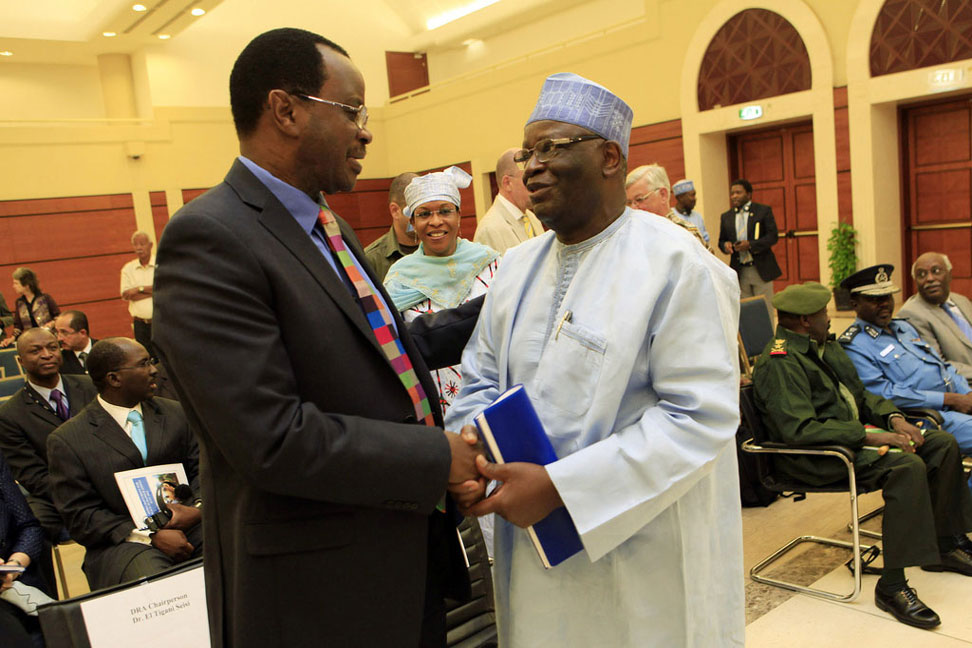
The commission monitoring the implementation of the Doha Document for Peace in Darfur, or DDPD, convened its second meeting in El Fasher, Darfur last month. But some separate statements by prominent Darfuri leaders who aren’t part of the Doha process highlight the need for a forthright assessment of what the DDPD can tangibly accomplish in terms of security and lasting peace in Darfur.
The Deputy Prime Minister of Qatar, Ahmed bin Abdallah al-Mahmoud, chaired the monitoring commission’s meeting, with representatives from key countries and international organizations, among them the U.S., China, the African Union, and the Arab League, also in attendance. The commission reviewed reports from the U.N./African Union Hybrid Mission in Darfur, or UNAMID, and the parties to the DDPD—the government of Sudan and the Liberation and Justice Movement, or LJM—on the implementation of the agreement to date. The commission also addressed possible ways in which a comprehensive and politically inclusive settlement to the conflict in Darfur may be achieved.
In his statement on the meeting, commission chairman Ahmed bin Abdallah al-Mahmoud noted, among other things, the need for non-signatories to “commit themselves to a negotiated settlement with the [government of Sudan] on the basis of the DDPD.” UNAMID head Ibrahim Gambari similarly encouraged non-signatory movements to join the DDPD and to work towards the goal of peace and stability in Darfur.
The non-signatory movements to which both the chairman and Gambari referred include some of Darfur’s largest and most militarily active rebel groups, among them the Justice and Equality Movement, or JEM, and both factions of the Sudan Liberation Movement, or SLM-Minni Minnawi and SLM-Abdel Wahid. Since the conclusion of the DDPD in July 2011, these groups have aligned themselves with the Sudan People’s Liberation Movement-North, or SPLM-N, the Beja Congress, and the Kush Liberation Movement under the unified Sudanese Revolutionary Front, or SRF. The SRF is actively calling for regime change in Sudan, while some of its members, namely the SPLM-N, continue to engage in ongoing armed resistance against the Sudanese government in South Kordofan and Blue Nile states.
In an interview, Minni Minnawi, the head of one SLM faction, criticized the chairman’s statement, saying that was “impossible” for his group and others to negotiate on the basis of the DDPD, an agreement that deals exclusively with Darfur. Instead, Minnawi called for “a comprehensive solution to all issues affecting Sudan and not just in Darfur.”
Recently, the former head of LJM’s delegation to the negotiation of the DDPD, Ahmed Abdelshafi, announced his repudiation of the DDPD and break with LJM. Abdelshafi said his decision came after Khartoum’s campaign of “racial cleansing” in South Kordofan and Blue Nile, and is emblematic of his decision to stand on “the side of the Sudanese people.”
The international community should heed the messages of both Minnawi and Abdelshafi and readjust its course vis-à-vis the Darfur peace process. A growing voice within Sudan is calling for a comprehensive approach to peace in the country, an approach that recognizes that the core issues underlying marginalization of populations in Darfur, South Kordofan, Blue Nile, Beja, and throughout the rest of Sudan are the same. The time has come for the international community to dispense with its stovepipe approach to conflict resolution in Sudan. Instead, the international community must now refocus its efforts on framing a negotiation process, in which the SRF members, along with other political parties, Sudanese civil society organizations, and other pro-democracy groups, may comprehensively address their grievances with Khartoum and lay the groundwork for an all-inclusive, comprehensive, and transparent constitutional process and democratic elections.
Tendai Zvobgo contributed to this post.
Photo: LJM leader Tijani Sessi with UNAMID chief Ibrahim Gambari (U.N. News Center)

